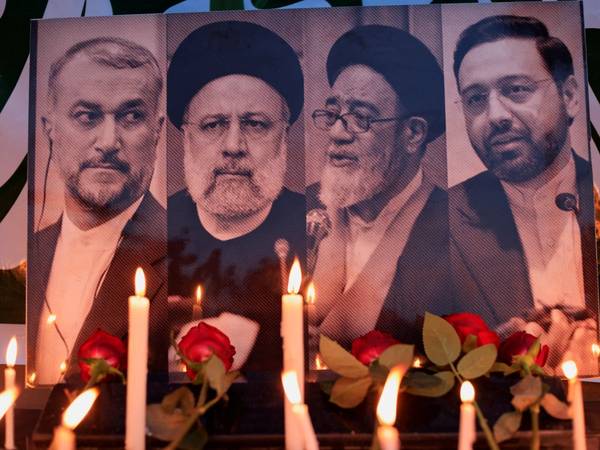The Biden administration’s message of sympathy for the death of Ebrahim Raisi sparked harsh criticism from US lawmakers and some Iranian-American activists who called the gesture a “slap” on the face of the late-president’s victims.
In a brief statement delivered by the State Department’s spokesman Matthew Miller Monday afternoon, the US government expressed “official condolences” for Raisi’s death alongside his foreign minister Hossein Amir-Abdollahian.
Raisi, who died in a helicopter crash in northwestern Iran on Sunday, was all but crowned President in an unfair and unfree election three years ago. Before that, he spent the entirety of his political life in the Islamic Republic’s judiciary, starting as a local prosecutor and making his way up to the top with absolute loyalty to the regime –and crucially, signing off thousands of summary executions in 1988.
Following his death –confirmed officially Monday– many Iranians let out their contentment despite threats of arrest and punishment by the authorities. The Biden administration, however, chose to go down the “diplomatic” path, while acknowledging that Raisi was not just any President.
“No question this was a man who had a lot of blood on his hands,” US National Security Council spokesman John Kirby told reporters Monday afternoon. “That said, as we would in any other case, we certainly regret in general the loss of life, and offered official condolences as appropriate.”
The “appropriate” measure angered US lawmakers and Iranian-American activists.
“I think it is disappointing for the Biden administration expressing condolences for the man who’s known as the Butcher of Tehran,” Senator Tom Cotton (R-AR) told Fox News. “The people of Iran are probably pretty pleased that the Butcher of Tehran is no longer there to torment them.”
Senator Cotton’s description seems to be accurate, as far as it can be gauged from Iranians’ expressions of jubilation in public. The US condolences, therefore, was seen as a blow by many activists, and yet another sign that the Biden administration did not care enough about their wishes and desires. This was accentuated by the images from the UN Security Council, where representatives, including the US deputy ambassador, stood in silence for a minute to mark Raisi’s death.
“When I saw one minute of silence at the United Nations… it was a slap on the face of Iranian women who got killed simply for showing their hair,” Iranian-American activist Masih Alinejad told ABC News. “It’s a slap on the face of men getting executed simply for protesting.”
The US government and the UN Security Council were not the only major institutions to draw harsh criticism for their diplomatic approach. The EU Commission and NATO, among others, were also lambasted when their top officials or spokespeople expressed sympathy with “the people of Iran,” misjudging –if not ignoring– the public mood in the country.
“I am flabbergasted by this tweet,” former NATO Assistant Secretary General Marshall S. Billingslea posted on X, quoting the NATO spokeswoman's post offering condolences for the death of Iran’s president and foreign minister. “This is completely inappropriate on so many levels,” Billingslea wrote.
The controversy is likely to continue at least until Wednesday when the official ceremony and funeral is planned to be held in Iran. Speculations have already started about foreign representatives that may attend. So much so that reporters asked Kirby about the US position and the possibility of the Biden administration sending a “delegation” to the ceremony.
“I don’t have anything on a delegation for a funeral to speak to today,” Kirby said, deciding not to offer a clear response, even though any US representation in an Iranian official ceremony seems highly unlikely.
